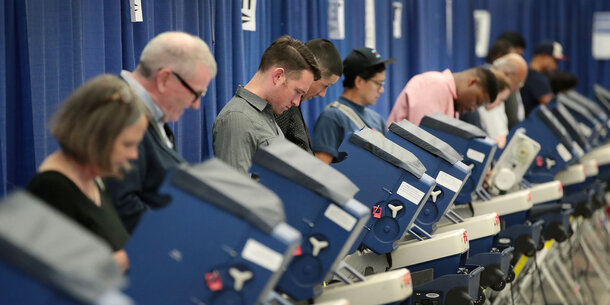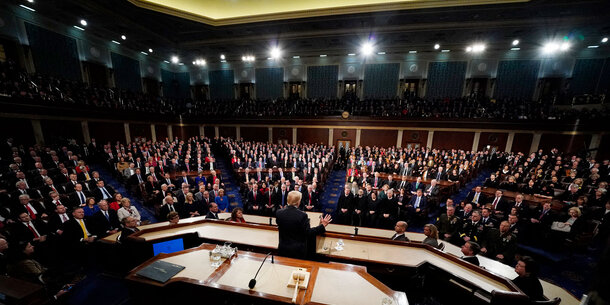State legislatures around the country are considering bills that would require Americans to present a passport or birth certificate to register to vote. Much of this legislation echoes the SAVE Act, a federal bill passed by the House in April that has now been pending in the Senate amidst significant opposition from legislators and constituents alike. It also mirrors a similar executive order signed by President Trump in March that two federal judges have partially blocked, including one in a Brennan Center lawsuit.
These policies purport to prevent widespread voting by noncitizens, which in reality is not a problem. Instead, the SAVE Act would block tens of millions of American citizens from voting because they don’t have ready access to the documents required. It would also upend voter registration systems nationwide. The state versions of the bill would cause similar damage to the freedom to vote.
Despite certain lawmakers prioritizing these suppressive policies, voters and advocates have been successful in slowing their progress in some states.
In total, lawmakers in at least 27 states have introduced one or more bills in 2025 that would require some or all voters to show citizenship documents to vote. So far, only Indiana and Wyoming enacted such laws.
New Show-Your-Papers Laws
Indiana’s new law mandates that anyone who registers to vote using temporary credentials — held by individuals including asylum seekers and people in the United States on residence or work visas — must show a passport, birth certificate, or naturalization paper within 30 days. The policy, however, makes no sense: People with temporary lawful status aren’t eligible to vote. Indeed, voting by noncitizens is an extraordinarily rare occurrence. The law could affect newly naturalized citizens, who are eligible to vote but may still be using an ID from before their naturalization. (Who goes to government offices to update their IDs earlier than they have to?) This bill could block them from registering and exercising their right to vote as new American citizens.
Wyoming’s new law requires people registering to vote to show a passport, birth certificate, or a Wyoming driver’s license, state ID card, or Real ID issued by another state provided there is no “indication that the person is not a United States citizen.” The vast majority of Real IDs — a more secure form of state ID — do not indicate citizenship.
The state concurrently passed a law that adds noncitizenship notations to licenses, including for lawfully present noncitizens. Since people often use their driver’s licenses for all sorts of interactions in their normal lives, such as checking into a hotel, this means people who are not U.S. citizens will have to carry around a document that identifies their immigration status. In a time of extreme xenophobia, unlawful detainments, highly publicized deportations, and threats of denaturalizing citizens, this policy adds to fears of harassment and arrest for not only those noncitizens in the country legally, but also immigrants who have become citizens.
Wyoming’s new voter registration requirement became law despite the governor’s decision not to sign it. He described it as unnecessary given existing Wyoming law and admitted it will be hard to implement and would likely face litigation, which it has.
New Hampshire voters experienced the chaos of a similar policy during a few local town elections in March. After the state passed a law requiring a birth certificate or passport to vote last year, nearly 100 voters were reportedly turned away at polling places for lacking proper documents to satisfy the new requirement. Some never returned. For others, it took multiple attempts to get the proper documents, including one woman whose name did not match her birth certificate because she was married. Many voters would experience similar issues under the SAVE Act.
Even after this troubling experience in March, the New Hampshire legislature attempted to advance a bill that would apply the same birth certificate or passport requirement to absentee ballots. Since New Hampshire only lets people who meet certain criteria vote absentee, older voters and voters with disabilities would be disproportionately affected by such a policy.
Last year, Louisiana took a more bare-bones approach when it enacted a law that directs the secretary of state to implement a requirement for voters to prove citizenship but gives no guidance on what documents would suffice. Tellingly, since it went into effect on January 1, there has been no instruction or implementation from the secretary of state’s office despite an election on May 3. As officials wrestle with the challenges of implementing the law, voters are left wondering what they’ll need to vote. Both New Hampshire and Louisiana are facing federal lawsuits challenging the constitutionality of these new laws.
State legislative action has, in large part, concluded for 2025, with most states now out of session for the rest of the year. Notable among bills that died at the end of legislative sessions includes a Texas bill that similarly tried to require a birth certificate or passport for voting. Ohio, on the other hand, has a yearlong legislative session and currently two of these types of bills are pending. Thus far, Ohio’s bills have made no progress beyond introduction.
Voter Purges
Seven states — Idaho, Indiana, Iowa, Kansas, Oklahoma, Utah, and Wyoming — have enacted voter purge laws this year that purport to target noncitizens. Removing ineligible people from the rolls as part of routine list maintenance is important to ensure voter rolls are up to date. But when done recklessly and when based on outdated or flawed data, as these laws demand, purges could lead to the removal of eligible American citizen voters.
Indiana’s new purge law builds on a law enacted last year that requires voters flagged by comparisons between the department of motor vehicles database and the voter rolls to show their citizenship papers within 30 days or be removed from the rolls. The new law, despite still requiring notices to be sent to affected voters, requires removals of individuals within 48 hours from the voter list if a comparison with DMV records indicates that the person didn’t provide documentation of their citizenship. DMV data is often outdated, as it may be years before people who became naturalized citizens provide their state’s agencies with updated information on their citizenship when they renew their driver’s license. This change could significantly increase the chances of wrongful removals of American citizens from the rolls.
Similarly, new laws in Iowa, Kansas, and Wyoming require rushed removals based on department of motor vehicle record comparisons with the voter rolls. Kansas’s removals must be conducted within five business days after these comparisons and require notification to purged individuals that they can rejoin the rolls only upon “providing proof of their citizenship” with no guidance on what that entails.
Wyoming’s law is similar: It orders the DMV to give the secretary of state information on anyone who has “indicated a noncitizen status” for removal from the rolls. If after an investigation on whether the registration should be cancelled the person comes off the rolls, the state must notify the voter of their removal. It provides no rules on how affected voters can prove their citizenship.
Iowa’s law creates a new voter registration status of “unconfirmed” rather than immediately cancelling a voter’s registration. If information is received “from a reliable source indicating that the registered voter is not qualified,” the voter goes into unconfirmed status, after which they can only vote after providing “evidence” that they are a citizen. Like the Wyoming law, Iowa’s is silent on what evidence suffices. In these cases, it is likely outdated DMV information will lead to the removals of eligible American citizens.
Utah and Idaho enacted laws that would require comparisons of registrants with information from the Systemic Alien Verification for Entitlements program, a federal program that allows states to verify the immigration and citizenship status of applicants seeking benefits or licenses. Wyoming’s purge law also permits the secretary of state to use this service. But the tool does not include information on all citizens born in the United States and recent changes made to the system risk misidentification. Purges based on inconclusive results from the program run the risk of disenfranchising eligible American citizens. Oklahoma’s new law gives the secretary of state even broader discretion, permitting the secretary to use any federal, state, or local agency, board, or commission’s data to verify citizenship. The secretary must notify the challenged voter that they have 30 days to provide proof of citizenship or face cancellation of their registration.
While not strictly a purge policy, Tennessee enacted a law that directs the coordinator of elections, in collaboration with the state’s Department of Safety, to create an online portal to verify the citizenship of people before processing their applications to register to vote based on records in the department’s file. The bill doesn’t specify what information would go into the portal, a lack of clarity that could result in application rejections based on outdated or unreliable data. Just last year, Tennessee threatened to remove thousands of eligible voters because of weak data. The state sent letters to 14,375 registered voters threatening potential removal, but backed down when at least 3,000 of those people responded with proof of their citizenship. It’s not clear the state identified a single noncitizen on the rolls.
Vast purges consistently ensnare eligible American citizens, including in states that have aggressively gone after alleged noncitizens. States such as Ohio, Texas, and Virginia have mistakenly removed eligible citizens from the rolls under similar programs. In Virginia last year, litigants easily identified dozens of citizens wrongly removed for reasons such as forgetting to check a box on a form at the DMV even after affirming multiple times on previous records that they were in fact U.S. citizens. A review by the Washington Post found no evidence that any noncitizens tried to vote in Virginia in the last few years. In Alabama last year, a federal court blocked a purge that would have mistakenly removed at least 2,000 eligible American voters.
• • •
Although many state legislators have introduced bills this year that require a birth certificate or passport to register to vote, only two bills have become law so far in 2025. The problem is not only that these bills would block millions of Americans from voting, but also that these requirements to vote are a massive burden for election officials and many voters alike.
Further, some of these policies may be illegal. The National Voter Registration Act prohibits states from requiring proof of citizenship to register for federal elections, a rule that the Supreme Court affirmed. That is why Arizona — the only state with a long-running birth certificate or passport mandate — requires it only for state elections.
By considering and rejecting these bills, most states have banded together to send Congress a clear message: Show-your-papers policies must be rejected in any form.





